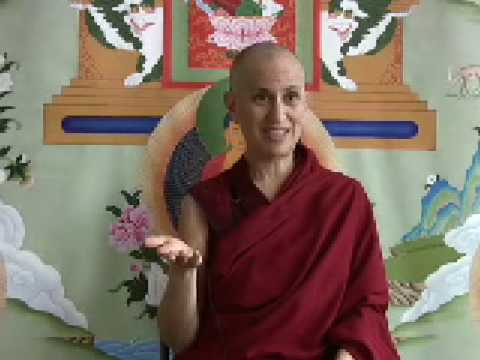Verse 36-2: Other people’s qualities
Verse 36-2: Other people’s qualities
Part of a series of talks on the 41 Prayers to Cultivate Bodhicitta from the Avatamsaka Sutra (the Flower Ornament Sutra).
- Seeing how a person’s qualities change depending on our point of view
- There is nothing inside of another person that makes them attractive (or repulsive) to us
41 Prayers to cultivate bodhicitta: Verse 36-2 (download)
Part 1
Part 2
“May all beings praise the qualities of all Buddhas and bodhisattvas.”
This is the prayer of the bodhisattva when seeing someone praise another.
Yesterday we were talking about praising others. Somebody gives us a present and we praise them.
When we are thinking about other peoples qualities, whether we praise them or criticize them, it always appears as if those qualities exist in the other person. If we praise somebody it’s because that person has some good quality inside of them, from their own side. Similarly, when our judgmental mind is functioning, it seems like there’s some stupid quality in them from their own side, because if these qualities didn’t exist in the other person, from the side of the person, then why would we have aversion and why would we have attraction? That’s the way it seems, doesn’t it?
You know what, the Vaibhashika, the Sautantrika, the Cittamatras, and the Svatantrikas will all agree with you. You have a lot of people on your side. But you know what? They’re wrong. According to the Prasangika, there is nothing from the side of the other person that makes them attractive to us. That sounds pretty weird, doesn’t it? That just doesn’t seem reasonable, does it? It’s got to be something inside of them from their own side. We are not stupid.
Audience: Why would somebody see something good and somebody else see something bad?
Venerable Thubten Chodron (VTC): You mean there’s that problem? That two people look at the same person and one sees good qualities and one see bad qualities? Or maybe they see the same quality and one sees that quality as good and one sees that quality as bad? Why would that happen?
Well, it’s just because other people are dumb, because our view is the right one because that quality really is in the other person. That’s how we think. Isn’t it? It seems very reasonable. If you say, “Well it couldn’t be from the side of the person because two people look at the same person from the same side from different positions.” But if that’s true then it makes no reason for any of them to feel attractive or averse because there is nothing from the side of the other person. Does that mean that we are all making it up?
Audience: Why?
VTC: It kind of seems that way doesn’t it? What does that say about our attachment to somebody else?
Audience: It’s perceived….
VTC: Yes. That’s why they say that you’re on Venus or on Mars because your reason has gone bye bye, hasn’t it? What does that have to do with praising somebody else? Does that mean that when we’re praising them that we’re just making up qualities?
Audience: We’re on the conventional level.
VTC:: Don’t they have attractive qualities by their own side?
Audience: Their own side has an ultimate nature.
VTC: Yes. If they have good qualities from their own side and I am praising their good qualities, (now we are not talking about attachment, we are talking about praise) I am praising their good qualities, shouldn’t they have those good qualities from their own side?
Audience: They can have those good qualities conventionally without having them ultimately.
VTC: But if they didn’t have something in them, then when I was praising them I would be lying.
Audience: There is no inherent existence.
VTC: They’ve got to have some good qualities for me to praise them; otherwise I am just buttering them up because they don’t really have that quality.
Audience: Good qualities are only seen relative to bad qualities, so you’re not seeing something that’s solid in good quality. It’s only when juxtaposed and has a relation to bad quality that you have to quantify it.
VTC: That’s true, but who labels what’s good and bad qualities?
Audience: Buddha!
VTC: If there is one person who, let’s say, they like to call and talk to you a lot. For one person that is such a good quality. They love this person who always likes to call and talk to them and be in touch. For another person, somebody who is like that it is a pain in the neck. They won’t leave you alone. They’re so insecure. The first person they’re fantastic, they’re not insecure at all. They’re just considerate and loving. So which are they?
Audience: It’s depends. It’s dependent.
VTC: Dependent? On what?
Audience: On the glasses you wear!
VTC: Which person is right? We say it depends, but then still even if it depends, if you think that is a good quality or a bad quality, is there one that’s right? When we praise people are we lying?
Audience: No.
VTC: Why not?
Audience: The basis would be according to your view.
VTC: According to my view?
Audience: Things function.
VTC: Uh huh. Things function….
Audience: This is our everyday experience.
VTC: But if I see something as a good quality and I praise it?
Audience: It’s a virtuous thing.
VTC: It’s virtuous for me to do that. What about if I’m praising somebody because they stole a bunch of ammunition and now I can go and blow something up? That person is so generous. They didn’t even charge me. They are practicing generosity. Isn’t that virtuous?
Audience: You get an unwholesome result.
VTC: But wholesome, unwholesome, isn’t that just your mind, projecting it?
Audience: No it depends on the result. More suffering is more suffering. Good or bad is the same as wholesome or unwholesome.
VTC: Suffering or not suffering, isn’t that just your projection too?
Audience: No because that third person is the one that is suffering when they get the ammunition on them. It’s not a projection.
VTC: They’re saying that but they’re saying that from their own viewpoint.
Audience: I’m going to go nihilist.
VTC: Ok, I will go in nihilistic but you’ve got to figure out why that isn’t true, because you see how it seems like it really has to exist in the object of the person, and it has to exist for us to be able to say it’s good or bad, attractive or unattractive. If it doesn’t exist then the whole thing is just your mind making it up. You see how we go? It is so easy. That’s why they say the middle way view is so difficult to figure out because you present it one way, “yeah there has to be something from their own side.” But if there isn’t, “well there can’t be something from it’s own side.” There is just your mind making it up. There is nothing out there. We don’t share any common reality at all. It’s just everybody is living in their own world.
Audience: Can’t you just stack it all on the causes, conditions, the parts and the labels, and then know that those can all be dissected away but they still exist. That is what you are resting it on.
VTC: Yes.
Audience: Things are done from those causes and conditions, we perceive them conventionally as them being virtuous. Those things could all go away but they are things that might merit our praise without going to the nihilistic view.
VTC: Could a person have a good quality that is a merely labeled good quality?
Audience: Yes all good qualities are merely labeled good qualities.
VTC: But don’t they have good qualities that is there inside of them?
Audience: Yes, but there is not a person for them to be inside of. [laughter]
VTC: They might have a merely labeled good quality, but doesn’t that good quality have to be inside of them and be merely labeled?
Audience: Where is it?
VTC: That’s what I’m asking you.
Audience: Is it in the liver? In the heart? [laughter]
VTC: Let’s think about that one.
Audience: It’s even easier to go from absolutism to nihilism. It’s easier to just say the lineage is wrong and what they are saying is just crazy. It does inherently exist, or it doesn’t exist at all.
VTC: Yes that’s what most people say. They say Prasangika is totally wrong. That’s what both the absolutist and nihilist say. Prasangika is totally wrong. Prasangika says the same thing about them.
Audience: Would the Cittamatras say that there is an actual quality out there?
VTC: Yes, the Cittamatras would say that, but that quality is empty of being a different substantial entity from your mind that’s perceiving it, but still it’s truly existent. That is this weird thing about Cittamatras, that things are truly existent but they still are empty of arising from a different substantial entity as the consciousness that’s perceiving them. They would say that the object is truly existent and the mind that’s perceiving them is truly existing. They arise from the same substantial cause. In both cases it’s the karmic imprint on the mindstream. The karmic imprint produces the you that I’m perceiving and produces my mind that’s perceiving.
Audience: You exist, but only because my mind created you?
VTC: That’s what they are saying.
Audience: Who’s the center of the universe?
Venerable Thubten Chodron
Venerable Chodron emphasizes the practical application of Buddha’s teachings in our daily lives and is especially skilled at explaining them in ways easily understood and practiced by Westerners. She is well known for her warm, humorous, and lucid teachings. She was ordained as a Buddhist nun in 1977 by Kyabje Ling Rinpoche in Dharamsala, India, and in 1986 she received bhikshuni (full) ordination in Taiwan. Read her full bio.


